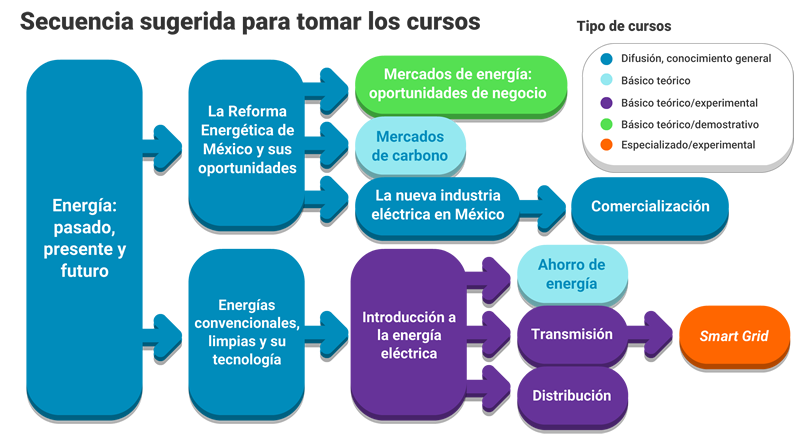Did you know that Mexico was one of the last countries that had a restructure of the electric field?
The electric field is very important and it has a strong impact on the competitiveness of the country. The reform to the Mexican electric sector opens opportunities for the state and the private industry to work together.
The restructure of the electric sector stimulates the investment in the development of the infrastructure of gas pipes, modernization of the generation park, giving priority to clean energies and the expansion of the electric network.
This course is a unique opportunity that will help you comprehend the situation previously to the reform, the current situation, and the challenges and business opportunities in the electric field.
LEARNING RESULTS.
Thanks to this course, you will be able to:
- Explain the situation of the electric sector before the reform through the identification of clean energies, renewable and conventional with its strengths and weaknesses.
- Present a new investment and business opportunity in the reformed electric sector.
Course Dates
Opening date: September 12, 2016
Starting date: February 13
Closing date: March 31
Certificate issued: April 14
Estimated Effort: 5 hours a week
Previous Requisites
High school level finished or in process
Course Level: Intermediate
Content: Spanish
Videos: Spanish
Transcripts: Spanish
Kind of Certificate: Free
Course level: Intermedio
Course Staff
Armando Llamas Terrés, Ph. D. He is an Electricity Engineer and has a Master degree in Engineering specialized in Electric Engineering, both academic degrees from Tecnológico de Monterrey. His Ph.D. n Electric Engineering is from the Polytechnic Institute of Virginia, in USA.
In the department of Electric Engineering at Tecnológico de Monterrey, campus Monterrey, he has been an adjoined professor from 1984 – 1985, a department coordinator from 1986 – 1988, and as an associate professor from 1993 – 1999. Since 2000, he has been head professor and director of the Energy Studies Center at Tecnológico de Monterrey.
He is part of the National System of Researchers (SNI-1) and the Association of Energy Engineers (AAE). He is the vice-president of the Mechanical and Electric Engineers College in Nuevo Leon, and professional member of the Electricity and Electronics Engineers Institute. (IEEE).
He is the co-author of the books: “Armónicos en sistemas eléctricos industrials” and “Tierras eléctricas”, published in 2004 and 2005.
He has done research on the fields of electric engineering and energetic engineering, particularly in aspects of electric energy quality, electric transitory systems, and energy management.
Fields
Science
Engineering
Economy and finance.
Topics:
Topic 1. What is the electric sector?
- The electric system, from planning to consumption.
- Generation.
- Transmission and distribution.
- Commercialization.
Topic 2. The Mexican electric sector before reforms.
- History of Mexican electric industry, planning and control before reform.
- Generation for public service and Independent Energy Producers (PIE)
- Self-supply and Co-generation.
- Transmission and distribution.
Topic 3. ¿Por qué fue necesaria la Reforma Eléctrica?
- The cost of electric energy.
- Competitivity of the country.
- Technical and Non-technical losses.
- The growth of electric sector and needs of investment.
Topic 4. The new organization of the Electric Industry.
- The electric industry in the main countries of the world.
- The restructure of CFE and the new actors in planning and control (SENER and CENACE)
- Evolution of the Comisión Reguladora de Energía (CRE)
- Transportation, distribution, suppliers, and commercial staff.
Topic 5. Private participation in new electric businesses
- Providing of primary consumables for the electric industry.
- Generation for the Electric Market and Distributed Generation.
- Participation in commercialization.
- Public-Private associations.
Topic 6. Big challenges and opportunities in the transition towards a more sustainable sector
- Goals of energetic transition.
- Clean energies.
- Clean energies certification.
- Long term biddings and rural electrification.
Suggested Sequence.

